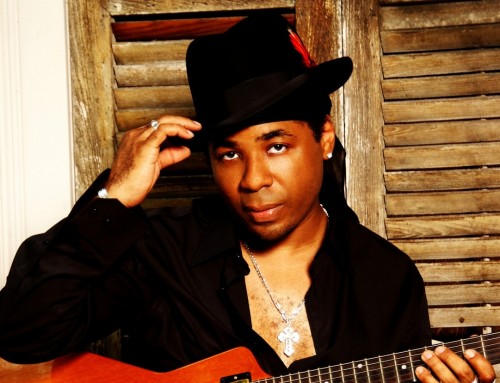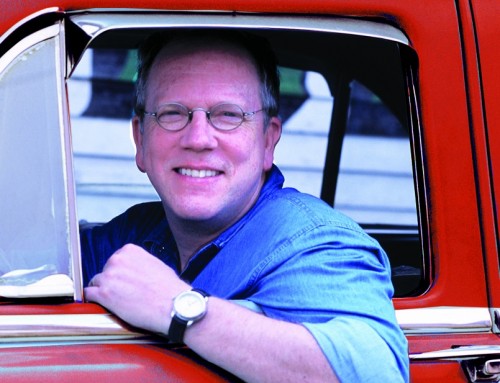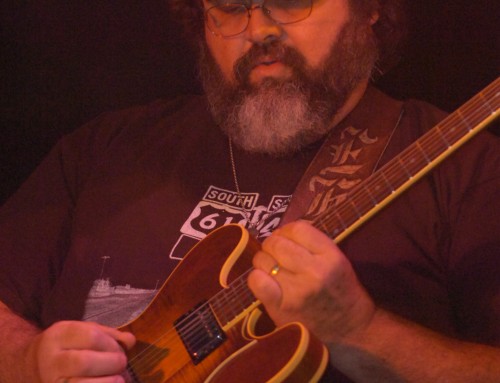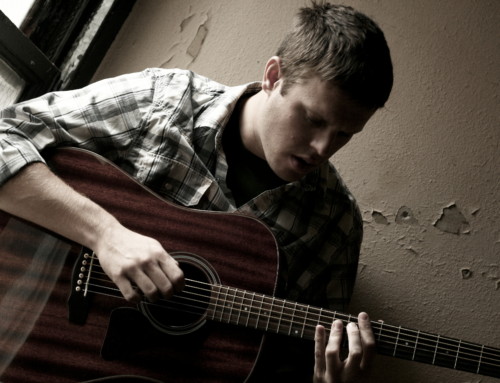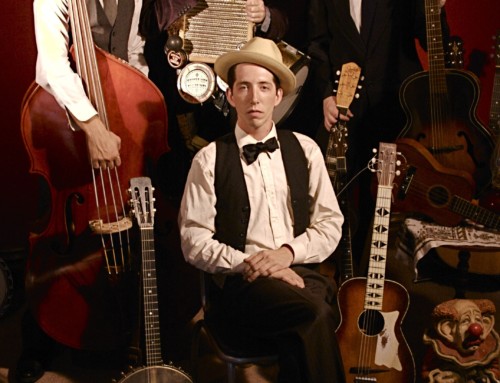The first time I saw William Elliott Whitmore perform was at an alternative country music festival. He walked on stage before a crowd still worked up from the previous high octane act. He settled into his chair and launched into an a capella version of a song called Cold and Dead, a haunting meditation about loss and letting go. Most performers who opened with a song like that would be heckled off the stage, but Whitmore, through the force of his character and that voice—oh, that deeply effecting voice—drew in the crowd, silenced them, and won them over.
Whitmore grew up on a blufftop farm in the Mississippi Valley near Keokuk, Iowa, a territory he still calls home. He has experienced his share of hardship in his 32 years, losing both parents before reaching adulthood. His songs carry the weight of those early losses. They also offer poignant portraits of rural life and of imperfect people and the search for redemption.
Whitmore tours extensively, and you must see him perform live. Don’t get me wrong: the recordings are great—I listen to them all the time—but you have to see him live. It’s the difference between watching porn and having sex: porn may meet the need but only the real thing feeds the soul.
Whitmore responded to my questions by email (January 2010).
Describe the area around Montrose where you grew up: did you live in the floodplain or on higher ground away from the river?
I grew up on the bluffs that run alongside the Mississippi in south Lee county. My farm is on high ground but not everyone is so fortunate. The floodwaters have splashed and soaked their way through the valley numerous times, and numerous times we have rebuilt homes, businesses, and livelyhoods. It’s not a bad thing, it’s just part of coexisting with nature. The river gives and the river takes away.
What role did the Mississippi River play in your life growing up? For example, were you down at the river nearly every day to fish, swim, etc?
The river was a big part of our lives. We fished, swam, and boated all the time. I still do. I live near one of the widest parts of the Mississippi, above lock and dam 19 in Keokuk. The dam causes the ice to break apart in the winter, exposing large areas of water. I enjoy watching the bald eagles catch fish there. Upriver, where the ice is solid, my grandpa used to put chains on his motorcycle tires and ride it on the frozen surface. It’s interesting how different animals react to natural occurrences.
Were you around many people who made their living from the river?
I knew a lot of guys who ran trot lines, including my own father, but none who made a strict living of it. He just did it to keep protein in our bellies. Of course, boat time is always eye-opening and inspirational, a different view on reality.
What music did you listen to growing up?
I listened to whatever my folks listened to, which, luckily for me, was mostly old country and blues. They loved Hank Williams, Willie Nelson, Ray Charles, Leadbelly, Lorretta Lynn and a lot in between.
What kinds of live music did folks play around Montrose and nearby towns?
When I was growing up, most of the bands that played out and about did strictly classic rock covers.
This was not entirely interesting to me. The music I enjoyed came from around late night bonfires, or family reunion picking sessions. There was this one old guy whose name was Russell Moore. He must have been in his mid-eighties. He couldn’t drive but he would catch rides to wherever folks were congregating and bring his little amp and guitar. He would bang on that thing for hours and I definitely learned how to attack an instrument from him.
What styles of music do you listen to now?
I listen to whatever I can get my hands on nowadays. I appreciate some hip hop, for the lyricism. I enjoy the French gypsies. I also like some types of experimental noise music. Whatever can trip my trigger.
How do you describe your musical style?
I describe my musical style as “Rustic soul.”
I’ve read before that you are a big fan of punk and hardcore. How did you get from those musical styles to what you are playing now? How did they influence your own music?
As I said before, I grew up listening to country and blues. In my teens I discovered punk rock and alternative music. When I started touring for a living in my early 20’s, I played a lot of shows with punk and hardcore bands. I would show up with a banjo and people were intrigued. That’s the scene I came up in. I was bringing hillbilly music to people who had never heard it.
What do you think defines Mississippi River Music?
River music is hard to define. It’s lonesome at times, hopeful at others. Like the river itself, it can sometimes flow nicely and sometimes exceed it’s banks, roaring along as it sees fit.
When you think about river music, what musicians come to mind? What styles come to mind?
When I think of musicians that embody a river style, I think of the Memphis bluesmen, the New Orleans jazz players, and the regular folks up and down the banks who live and breathe river air. Anyone who knows what it’s like to watch the barges lock through the dam, or to have callouses on their hands from filling up sandbags as the waters rise in Spring. Not all of our songs are about the Mighty Miss, but she’s always in our hearts.
Who are some contemporary musicians who play river music? Who are today’s standout roots musicians from the Mississippi River Valley?
As far as current musicians who carry on the spirit, I would say people such as Greg Brown, David Zollo, the Pines, Pieta Brown, Tim Wehrle, Strawfoot, Dustin Bush, and Joe and Vicki Price to name a few. There are too many to list!
River Songs: Lee County Flood, Don’t Need It
Other Song You Shouldn’t Miss: Midnight
Visit his website here
© Dean Klinkenberg, 2011

